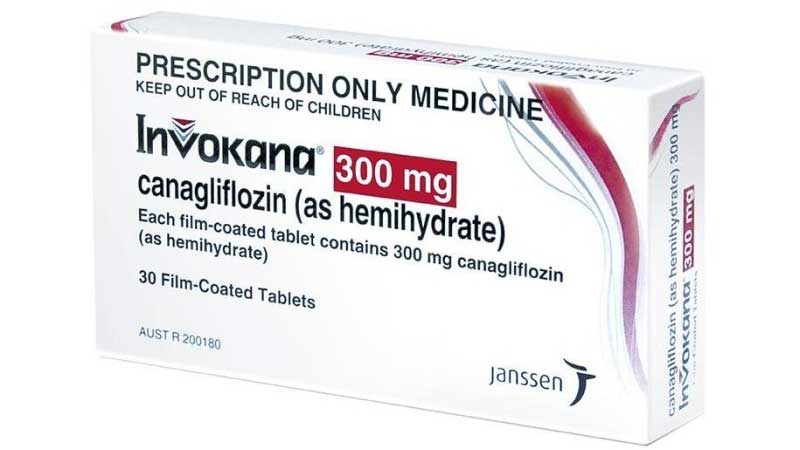Health Canada Approves INVOKANA®, the treatment for Diabetic Kidney Disease
Wednesday, 29 January 2020 08:00.AM
- Health Canada Approves New Indication for INVOKANA®* (canagliflozin) to Reduce the Risks Associated with Diabetic Kidney Disease in Patients with Type 2 Diabetes.
- INVOKANA® is the only diabetes treatment in Canada approved to treat this patient group. -
The Janssen Pharmaceutical Companies of Johnson & Johnson announced today that following a Priority Review, Health Canada has approved INVOKANA® (canagliflozin) as an adjunct to diet, exercise, and standard-of-care therapy, to reduce the risk of end-stage kidney disease (ESKD), doubling of serum creatinine, and cardiovascular (CV) death in adult patients with type 2 diabetes mellitus and diabetic nephropathy (also known as diabetic kidney disease) with albuminuria (>33.9mg/mmol).
Diabetes is the leading cause of kidney disease in Canada; up to one in two people with diabetes will experience signs of kidney damage in their lifetime. Diabetic kidney disease (DKD) is progressive and if left untreated, can lead to dialysis or kidney transplant. In addition, people living with diabetic kidney disease are at a high risk for heart attack and stroke.
"This is an important advancement given the increased prevalence of diabetic kidney disease in those living with type 2 diabetes," said Adeera Levin, M.D., F.R.C.P.C., F.A.C.P., C.M., Head, Division of Nephrology, Professor of Medicine, University of British Columbia, Executive Director, BC Provincial Renal Agency and CREDENCE National Lead Investigator for Canada.** "With this new indication for INVOKANA®, physicians are now able to offer a treatment option that reduces the cardiovascular and kidney risks associated with diabetic kidney disease."
The new indication is based on results from the landmark Phase 3 CREDENCE study, the first dedicated renal outcomes study of any sodium-glucose co-transporter 2 (SGLT2) inhibitor in patients with type 2 diabetes and diabetic nephropathy. In CREDENCE, INVOKANA® added to standard-of-care therapy demonstrated a 30 per cent reduction in the risk of the primary composite endpoint, comprised of end-stage kidney disease (ESKD), doubling of serum creatinine and renal or CV death, compared to standard-of-care therapy alone. Results also showed INVOKANA® reduced the risk of secondary CV endpoints, including a 31 per cent reduction in the risk of the composite of CV death or hospitalization for heart failure, a 20 per cent reduction in MACE (major adverse cardiovascular events; composite of CV death, nonfatal myocardial infarction [MI] and nonfatal stroke), and a 39 per cent reduction in the risk of hospitalization for heart failure alone. Importantly, the study showed no imbalance in lower limb amputations or bone fractures and no new safety concerns were identified in this study of high-risk renal patients.
ABOUT INVOKANA®
INVOKANA® is an oral, once-daily prescription treatment used to lower blood glucose (sugar) levels in adults with type 2 diabetes. INVOKANA® belongs to a class of medications called sodium glucose co-transporter 2 inhibitors, which offer a novel approach to treating type 2 diabetes by increasing the excretion of glucose in the urine, resulting in a reduction of blood glucose. INVOKANA® has been studied in more than 18,000 patients with type 2 diabetes across 14 double-blind, controlled Phase 3 and Phase 4 clinical trials.
INVOKANA® was approved by Health Canada on May 23, 2014 as monotherapy or in combination with other antihyperglycemic agents as an adjunct to diet and exercise to improve glycemic control in adult patients with type 2 diabetes. INVOKANA® received Health Canada approval for reduction of the risk of major adverse cardiovascular events on October 17, 2018 and was approved as an adjunct to diet, exercise, and standard-of-care therapy to reduce the risk of ESKD, doubling of serum creatinine, and CV death in adults with type 2 diabetes and diabetic kidney disease on January 24, 2020.8 INVOKANA® is currently approved as a single agent in 79 countries.
Common side effects reported with INVOKANA® include vaginal yeast infection, hypoglycemia, yeast infection of the penis, urinary tract infection, increased urination, constipation, skin ulcer, nausea and thirst.
Please consult the Product Monograph available at www.janssen.com/canada/pr... for important information relating to:
Contraindications: patients hypersensitive to drug or any ingredient in the formulation or patients on dialysis.
The most serious warnings and precautions regarding diabetic ketoacidosis (DKA) and lower limb amputation.
Other relevant warnings and precautions regarding: reduced intravascular volume; hypoglycemia; increases in LDL-C; necrotizing fasciitis of the perineum (Fournier's gangrene); elevated hemoglobin/hematocrit; hypersensitivity reactions, including angioedema and anaphylaxis; bone fracture; use in patients with severe hepatic impairment, or in pregnant and nursing women; assess prior to dosing and monitor renal function.
Canagliflozin is licensed from Mitsubishi Tanabe Pharma Corporation. Trademarks are those of their respective owners.
The new indication is based on results from the landmark Phase 3 CREDENCE study, the first dedicated renal outcomes study of any sodium-glucose co-transporter 2 (SGLT2) inhibitor in patients with type 2 diabetes and diabetic nephropathy. In CREDENCE, INVOKANA® added to standard-of-care therapy demonstrated a 30 per cent reduction in the risk of the primary composite endpoint, comprised of end-stage kidney disease (ESKD), doubling of serum creatinine and renal or CV death, compared to standard-of-care therapy alone.5 Results also showed INVOKANA® reduced the risk of secondary CV endpoints, including a 31 per cent reduction in the risk of the composite of CV death or hospitalization for heart failure, a 20 per cent reduction in MACE (major adverse cardiovascular events; composite of CV death, nonfatal myocardial infarction [MI] and nonfatal stroke), and a 39 per cent reduction in the risk of hospitalization for heart failure alone. Importantly, the study showed no imbalance in lower limb amputations or bone fractures and no new safety concerns were identified in this study of high-risk renal patients.
- Related materials:
